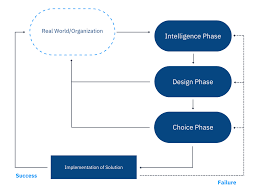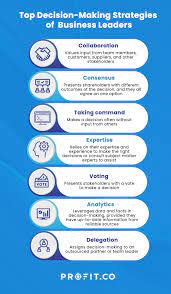The Importance of Non-Programmed Decision Making
When it comes to decision making in organizations, there are two main types of decisions: programmed and non-programmed. While programmed decisions are routine and repetitive, non-programmed decisions are unique and require a higher level of analysis and creativity.
Non-programmed decisions are crucial for organizations to adapt to changing environments, solve complex problems, and seize new opportunities. These decisions often involve uncertainty, ambiguity, and a lack of predefined procedures.
One key characteristic of non-programmed decision making is that it requires managers to use their judgment, intuition, and experience to evaluate different alternatives and choose the best course of action. This type of decision making is essential for strategic planning, innovation, and handling unexpected situations.
Non-programmed decisions also encourage flexibility and adaptability within organizations. By allowing managers to think outside the box and consider unconventional solutions, non-programmed decision making can lead to breakthroughs and competitive advantages.
While programmed decisions are necessary for day-to-day operations, it is the non-programmed decisions that drive long-term success and growth. Organizations that excel at non-programmed decision making are better equipped to navigate uncertainty, respond to change, and capitalize on emerging trends.
In conclusion, non-programmed decision making plays a vital role in organizational effectiveness and competitiveness. By embracing uncertainty and complexity, managers can make informed choices that propel their organizations forward in an ever-evolving business landscape.
9 Essential Strategies for Effective Non-Programmed Decision Making
- Gather relevant information before making a decision.
- Consider the potential consequences of each option.
- Consult with others to gain different perspectives.
- Evaluate the risks associated with each choice.
- Trust your intuition or gut feeling when uncertain.
- Take your time to weigh the pros and cons of each alternative.
- Be open to adapting your decision based on new information.
- Reflect on past experiences to learn from previous decisions.
- Seek feedback from trusted individuals before finalizing your choice.
Gather relevant information before making a decision.
When faced with a non-programmed decision, it is essential to gather relevant information before making a choice. By collecting and analyzing pertinent data, you can ensure that your decision is well-informed and based on facts rather than assumptions. This proactive approach not only increases the likelihood of making the right decision but also helps in understanding the complexities of the situation at hand. Gathering relevant information empowers you to assess different alternatives thoroughly and make a strategic choice that aligns with your goals and objectives.
Consider the potential consequences of each option.
When making non-programmed decisions, it is essential to carefully consider the potential consequences of each option. By evaluating the possible outcomes of different choices, managers can assess risks, benefits, and impacts on various stakeholders. This thoughtful analysis helps in making informed decisions that align with organizational goals and values, ultimately leading to more effective and successful outcomes.
Consult with others to gain different perspectives.
When facing non-programmed decisions, it is beneficial to consult with others to gain different perspectives. Seeking input from colleagues, mentors, or experts can provide valuable insights and alternative viewpoints that may not have been considered otherwise. By engaging in discussions and soliciting feedback from others, decision makers can broaden their understanding of the situation, identify potential risks or opportunities, and ultimately make more informed and well-rounded decisions. Collaboration and seeking diverse perspectives can help navigate the complexities of non-programmed decision making effectively.
Evaluate the risks associated with each choice.
When making non-programmed decisions, it is essential to evaluate the risks associated with each choice. By carefully assessing the potential risks and uncertainties of different alternatives, managers can make more informed decisions that align with their organization’s goals and values. Understanding the risks involved allows for better mitigation strategies to be put in place, ensuring that the chosen course of action is well-prepared for any potential challenges that may arise. Evaluating risks also helps in weighing the potential rewards against the possible negative outcomes, enabling decision-makers to make choices that offer the best overall benefit to their organization.
Trust your intuition or gut feeling when uncertain.
When faced with uncertainty in non-programmed decision making, it can be beneficial to trust your intuition or gut feeling. Intuition is a powerful tool that can provide valuable insights and guidance, especially when traditional analysis falls short. By tapping into your instincts, you may uncover hidden patterns, preferences, or solutions that can lead to more informed and effective decision making in complex and ambiguous situations. Trusting your intuition can help you navigate uncertainty with confidence and make decisions that align with your values and goals.
Take your time to weigh the pros and cons of each alternative.
When faced with non-programmed decisions, it is essential to take your time to carefully evaluate and weigh the pros and cons of each alternative. By thoroughly analyzing the potential outcomes and considering all factors involved, you can make a more informed decision that aligns with your goals and priorities. Rushing through the decision-making process may lead to overlooking important details or making hasty choices that could have negative consequences in the long run. Patience and thoughtful consideration are key when navigating complex and unfamiliar decision-making situations.
Be open to adapting your decision based on new information.
To effectively navigate non-programmed decisions, it is essential to remain open to adapting your chosen course of action based on new information that may arise. Flexibility and a willingness to reassess and adjust your decision in light of changing circumstances can lead to more successful outcomes. By staying open-minded and responsive to new insights or developments, you can make informed decisions that are better aligned with the evolving needs and challenges of the situation at hand.
Reflect on past experiences to learn from previous decisions.
Reflecting on past experiences is a valuable tip when it comes to making non-programmed decisions. By taking the time to analyze and learn from previous decisions, individuals can gain insights into what worked well and what didn’t in similar situations. This reflection process allows for a deeper understanding of the outcomes of past decisions, helping individuals make more informed choices in the future. Drawing on past experiences can provide valuable lessons and perspectives that can guide individuals in making effective non-programmed decisions that lead to positive results.
Seek feedback from trusted individuals before finalizing your choice.
Seeking feedback from trusted individuals before finalizing your non-programmed decision can provide valuable insights and perspectives that you may not have considered on your own. Trusted individuals can offer constructive criticism, alternative viewpoints, and potential consequences that you may have overlooked, helping you make a more informed and well-rounded decision. By involving others in the decision-making process, you can increase the likelihood of success and reduce the risk of overlooking important factors that could impact the outcome of your choice.




